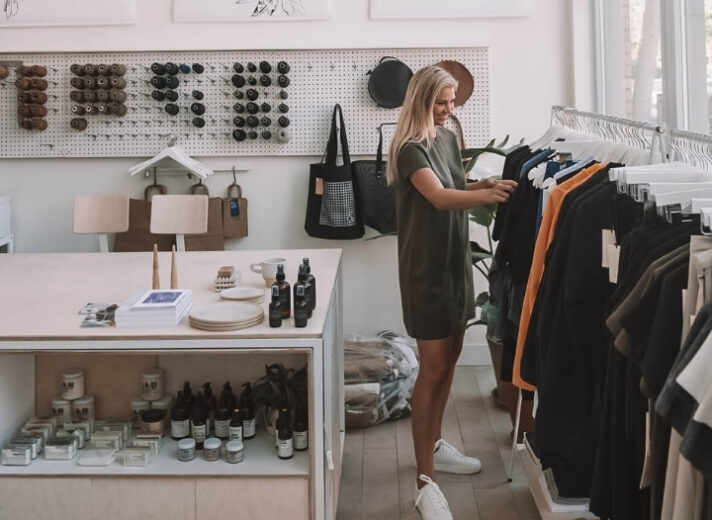Are you searching for exquisitely crafted Barong Tagalog, elegant Americana suits, sophisticated evening gowns, or contemporary Modern Filipiniana ensembles? Explore a diverse selection of these custom-made garments, expertly tailored to your style and preference, at the newly established Kamuning Public Market in Quezon City. Discover skilled artisans and talented designers showcasing their finest creations, all in one vibrant marketplace known for its rich tradition in Philippine fashion.
Kamuning Public Market
Kamuning Public Market stands as Metro Manila’s premier destination for custom-made barong and traditional Filipino formal wear. This bustling marketplace has built a reputation over decades as the go-to place for high-quality, affordable, tailored clothing that serves everyone from everyday customers to VIPs.
The market features over 176 stalls where customers can select fabrics and have custom-made barong Tagalog, Filipiniana, suits, and gowns created on-site by skilled local tailors. The new four-story facility offers a clean and organized environment where shoppers can browse extensive textile selections and work directly with craftspeople to create perfectly fitted formal wear.
The market combines traditional Filipino craftsmanship with modern convenience, making quality custom clothing accessible to people across all budget ranges.
History and Origins
Kamuning has long been recognized as the go-to place for fabric and custom tailoring in Metro Manila. The area developed its reputation over decades as skilled tailors and textile merchants established shops to serve customers needing formal attire.
The market’s specialization in custom clothing grew organically. Local seamstresses and tailors discovered they could serve customers better by concentrating their expertise in one location.
Recently, the Quezon City government opened a new four-story textile market building. This modern facility replaced older structures and provides better space for vendors and customers.
The new 176-stall facility represents a major investment in preserving Kamuning’s textile heritage. Mayor Joy Belmonte personally inspected the building to ensure quality standards were met.
How to get to Kamuning Public Market
Kamuning Public Market is located along L. Sianghio Street, near Kamuning Road in Quezon City, Metro Manila. There are several easy ways to get there depending on your starting point and preferred mode of transport:
By MRT (Train)
- Ride the MRT-3and get off atGMA-Kamuning Station.
- From the station, you can either:
- Walk (about10–15 minutes, ~1 km), or
- Take ajeepney or tricyclegoing towardKamuning Market or L. Sianghio Street, Quezon City.
The route from MRT-3 GMA-Kamuning Station to Kamuning Public Market is short and direct.
By Bus or Jeepney
- FromEDSA, take anybus or jeepneyheading towardQuezon AvenueorE. Rodriguez Sr. Avenue.
- Get off nearKamuning Road or L. Sianghio Street, Quezon City — the market is right along this intersection.
You can use public transit apps like Sakay.ph or Moovit to get real-time directions and schedules.
By Car
- UseGoogle MapsorMapQuestand search for “Kamuning Public Market.”
- The main address is:
L. Sianghio Street, Quezon City, Metro Manila. - Parking may be limited, so plan accordingly.
The accessibility has contributed to the market’s growth as a regional destination. People travel from different parts of Metro Manila specifically to shop for textiles and custom clothing.
Market Layout and Atmosphere
The new four-story building houses 176 stalls dedicated to textile and tailoring services. Each floor provides clean, well-lit spaces for vendors to display fabrics and conduct fittings.
The facility offers both retail fabric sales and on-site tailoring services. Customers can purchase cloth and have garments made in the same location.
Market features include:
- Clean, spacious aisles
- Proper ventilation and lighting
- Organized stall arrangements
- Fitting areas for customers
Textile shops operate both inside the main building and in surrounding areas. This creates a concentrated shopping district focused on fabrics and custom clothing.
The atmosphere remains busy but organized. Vendors specialize in different types of garments, from barong tagalog to wedding gowns and uniforms.
Barong Tagalog Customization Services
Tailoring Process
The custom barong creation starts with a consultation between the customer and tailor. Customers discuss their preferred style, occasion, and design details during this meeting.
Tailors take initial measurements using traditional measuring techniques. They record chest, shoulder, waist, and arm measurements with precision.
Most custom barongs require 7-10 days for completion. Rush orders may be available for an additional fee, though quality remains the priority.
Experienced tailors like those at L. Mendoza Tailoring and shops around Kamuning use hand-sewing techniques for delicate details. Machine sewing handles the main construction while hand-finishing adds traditional touches.
Materials and Fabrics Offered
Kamuning Market tailors stock traditional barong fabrics including jusi, piña, and organza. These materials create the signature translucent look of authentic barongs.
Jusi fabric offers durability and affordability for everyday formal wear. Piña fabric provides premium quality with its fine pineapple fiber construction.
Available fabric options include:
- Jusi (banana silk blend)
- Piña (pineapple fiber)
- Organza (silk or polyester)
- Cocoon (raw silk)
- Linen blends
Fabric prices vary based on quality, origin, and embroidery. Local fabrics cost less than imported materials but maintain good quality standards.
Shops like Kairi’s Textile at Stall 56 specialize in barong fabrics and wool materials. They offer both ready-made and custom fabric options for different budgets.
Measurement and Fitting Services
Professional measurement services ensure proper fit for each custom barong. Tailors use standard Filipino formal wear measurements adapted to individual body types.
The first fitting happens when the barong is 70% complete. This allows for major adjustments before final construction.
Key measurements include:
- Chest circumference
- Shoulder width
- Sleeve length
- Torso length
- Waist measurement
Fitting appointments typically last 15-20 minutes. Customers try on the partially completed barong while tailors mark necessary adjustments.
A second fitting occurs before completion to ensure perfect fit. Minor adjustments like sleeve length or torso fit get finalized during this session.
Most shops offer free alterations within 30 days of purchase. This covers minor adjustments needed after the customer wears the barong.
Textile Variety and Fabric Selection
Types of Fabrics Available
The market stocks several fabric categories suited for barong tagalog and Filipino formal wear. Piña fabric remains the premium choice for traditional barong, made from pineapple leaf fibers.
Jusi fabric serves as a popular mid-range option. This silk-pineapple blend provides elegance at a lower cost than pure piña.
Cocoon fabric offers durability and affordability. Many customers choose this material for everyday formal wear and office barong.
Linen and cotton blends provide comfort in tropical weather. These fabrics work well for casual barong and lightweight formal shirts.
Silk fabrics add luxury to special occasion pieces. Vendors carry various silk weights from lightweight to heavy ceremonial grades.
Polyester blends cater to budget-conscious buyers. These synthetic options resist wrinkles and require less maintenance than natural fibers.
Sourcing Local vs Imported Textiles
Local textile production focuses on traditional Filipino materials. Piña and jusi fabrics come primarily from domestic sources in Aklan and other provinces.
Philippine weavers produce cocoon fabric using local silkworms. This creates jobs in rural communities while maintaining traditional techniques.
Imported fabrics expand selection options for customers. China and Thailand supply silk varieties not available locally.
European linen imports offer premium quality for high-end barong. These materials cost more but provide superior durability and appearance.
Cost differences between local and imported fabrics vary significantly. Local piña costs P800-1,500 per yard while imported silk ranges from P300-800 per yard.
Many vendors mix local and imported inventory. This strategy allows them to serve customers across different price points and preferences.
Trends in Textile Choices
Modern barong styles drive demand for lighter fabrics. Younger customers prefer breathable materials like cotton-linen blends over heavy traditional weaves.
Color preferences have shifted beyond traditional white and cream. Vendors now stock pastels, earth tones, and subtle patterns for contemporary looks.
Embroidery-ready fabrics gain popularity as customers seek unique designs. Plain weaves that showcase custom needlework sell well during wedding seasons.
Sustainable options attract environmentally conscious buyers. Organic cotton and naturally-dyed fabrics appeal to this growing market segment.
Quick-turnaround materials meet modern scheduling demands. Fabrics that tailor easily and require minimal finishing help vendors complete rush orders.
Wrinkle-resistant blends suit busy professionals. These practical choices maintain appearance throughout long workdays and travel.
Notable Barong Designers and Vendors
Popular Shops in Kamuning
Lily’s Textile stands as one of the most recognized vendors in the market. Many customers choose this shop for wedding barongs and formal events.
The business has built a strong reputation for quality work. Wedding parties often order matching barongs from this establishment.
4th Quadrant Textile offers another reliable option for custom barong orders. This shop provides both traditional and modern barong designs.
Bonnie’s Tailoring operates as a family business founded by Bonnie Manabat. His son Inggo now runs the daily operations.
Jeff Hererrais our recommended tailor for those who are looking for Mens formal wear. You may contact him at 0975-0748868.
The shop has decades of experience in the textile trade. They offer custom-made barongs with hand or computerized embroidery options.
These established vendors typically operate from 8:00 am to 8:00 pm daily. Most shops accept both ready-to-wear purchases and custom orders.
Custom-Made Barong Artisans
Local artisans in Kamuning specialize in both traditional and modern barong styles. They offer hand-embroidered and computerized embroidery techniques.
Most tailors provide made-to-measure services for perfect fitting. Customers can choose from various fabric options and design elements.
The craftspeople work with different price points and quality levels. Many offer polo barongs (Gusot Mayaman), formal barongs, and contemporary designs.
Custom orders typically require fittings and advance notice. Artisans often accommodate special requests for unique designs or specific measurements.
These skilled workers serve both local customers and clients from other regions. Many have experience creating barongs for weddings, formal events, and business occasions.
Frequently Asked Questions
What are the operating hours for tailoring services at Kamuning Public Market?
The New Kamuning Textile Market operates during standard market hours. Individual tailoring shops within the 176 stalls may have varying schedules.
Customers should contact specific tailors directly to confirm their operating hours. Some shops may offer extended hours during peak seasons or special occasions.
Can I find traditional and modern barong styles at the textile market in Kamuning?
The textile market offers both traditional and modern barong styles. Tailors create custom-made barongs, suits, and other Filipino formal wear according to customer preferences.
The facility specializes in affordable custom-made garments. Customers can choose from various barong designs ranging from classic cuts to contemporary styles.
What types of fabrics are available for custom barong at Kamuning Market?
The market provides access to various textile options for barong construction. Raw textiles and fabric materials are available throughout the four-story facility.
Different stalls offer diverse fabric selections. Customers can browse multiple vendors to find suitable materials for their custom barong orders.
Are there options for women’s traditional Filipino attire at the Kamuning textile market?
The market creates custom-made Filipiniana dresses and gowns for women. Tailors also produce uniforms, costumes, and other traditional Filipino garments.
Female customers can order various traditional outfits including formal gowns. The facility serves clients seeking both everyday and special occasion Filipino attire.
How do I ensure a proper fit when ordering a custom-made barong?
Customers should schedule fitting appointments with their chosen tailor. Professional tailors at the market take detailed measurements to ensure proper fit.
Multiple fittings may be necessary during the construction process. Clients should communicate specific fit preferences and comfort requirements to their tailor.
What is the average cost and turnaround time for a custom-made barong in Kamuning Market?
The market focuses on providing affordable custom-made garments. Exact pricing varies depending on fabric choice, design complexity, and individual tailor rates.
Turnaround times depend on the specific tailor and current workload. Customers should discuss both pricing and completion dates directly with their chosen service provider before placing orders.
Manila Travel Tour Packages You Should Try
Follow and Subscribe to OutofTownBlog.comon Facebook , Twitter, Instagram , Pinterest , and YouTube for more Travel related updates.
Read: UNESCO Names Baguio City As The First Creative City in the Philippines


 12 hours ago
4
12 hours ago
4





















 English (US) ·
English (US) ·  French (CA) ·
French (CA) ·